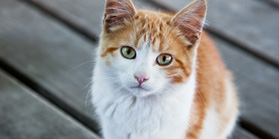Wildlife
- Squirrel
- Rat
- Bat
- Mice
- Raccoon
- Dead Animal
- Birds
- Snake
- Beaver
- Opossums
- Bobcat
- Armadillo
- Wildlife Management Programs
Domestic Animals
Pest Control
Trash Removal
Cats
If you are currently dealing with domestic or wildlife problems here are some quick numbers to get direction and resolutions to your animal or insect problems:
- Florida - Domestic Animals ( Cats and Dogs ): 305-884-1101
- Florida - Wildlife Removal, Control (Squirrels, Bats, Rats, etc): 877-427-1524
- Georgia - Domestic Animals ( Cats and Dogs ): 706-790-6836
- Georgia - Wildlife Removal, Control (Squirrels, Bats, Rats, etc): 877-427-1608
- Miami & Ft Lauderdale - Pest Control Services (Termites, Roaches, etc): 786-251-9640
- Palm Beach & West Palm Beach - Pest Control Services (Termites, Roaches, etc): 877-590-0462

The domestic cat is a very intelligent, very independent animal. They only do what they feel like doing, when they feel like doing it. They will not hesitate to demand whatever they want, be it food, play, or to be left alone.
Cats have different personalities. Some are the quiet type, while some meow all the time, some are fussy and very selective about food and people and some will eat anything and want attention from every person. Some like to be held and to sit on laps and some are loners and do not want much to do with people.
When a cat wants to get your attention it will either endlessly meow at you, rub against your leg or follow you around. Some cats are smarter than others. Some really seem to be paying attention to the world around them—watching, listening and taking in all that is going on as if they really understand it all. Some outdoor cats have even been known to look both ways before crossing the street. Cats are capable of all kinds of intelligent and sometimes surprising behavior. Some cats enjoy watching TV and even listening to the radio.
You can tell if your cat is relaxed by lifting it up; a relaxed cat is loose and light, and a scared cat is tight and heavy. Some may even learn to do tricks, just like dogs! Cats like to take many short naps during the day, hence the expression ”cat nap.” Where they choose to sleep varies with their personality. Some like to sleep in places like high cupboards, secluded and out of the way, while others like to be right amongst all the action. Some like soft warm places, others like sunny nooks and crannies.
Cats have a tendency to sharpen their claws and they may do this in places you do not wish them to do so, i.e. the couch. Giving the cat a place where he can sharpen his claws such as a scratching post and keeping the claws cut short is recommended. Giving your cat a scratching post covered in carpet is not always the best idea as it will be teaching your cat that scratching fabric is OK, i.e. your couch. Instead, the scratching post should be sisal rope or carpet turned inside out. With some effort, cats can be taught that the scratching post is the designated scratching area. Some choose to declaw their cats.
Declawing a cat is the surgical removal of the cat’s toenails, however this is very painful for the cat as a cat’s claw is actually a movable digit attached to muscle—the same as a finger. It has strong ligaments and tendons which give power to extend and retract the claws. A declawed cat can no longer properly grasp, hold or establish footing for proper walking, running, springing, climbing or stretching, and therefore should never be let outside of the house. It will no longer be able to properly defend itself or climb a tree to get away from predators.
Stray Cats in your neighborhood?
 There is no leash law in Miami-Dade County pertaining to cats. Unlike dogs, cats are permitted to roam freely. Animal Services does not respond to complaints of stray or feral cats.
There is no leash law in Miami-Dade County pertaining to cats. Unlike dogs, cats are permitted to roam freely. Animal Services does not respond to complaints of stray or feral cats.
There is no limit to the number of cats a person can own. However, all cats over 4 months of age must be vaccinated against rabies. Cat license tags are optional and are valid for the lifetime of the cat. The feeding of stray or feral cats does not constitute ownership.
Traps
Citizens may lawfully place humane animal traps on their private property to capture any cats that may enter. However, if the cats are on private common grounds, the homeowners association would need to initiate the removal process.
Animal Services has a limited number of cat traps available on a first-come, first-serve basis. There is a refundable $50.00 deposit required for a trap. If trapping the animal is very difficult, you may wish to consider hiring a private animal removal service which can do the work for a fee.
Trapped cats must be transported by the citizen to Animal Services. The animal is accepted without charge at the Animal Services shelter.
It is illegal to remove animals and "relocate" them without the property owner's permission and a period of confinement for the animals to become adjusted.
Stray or feral cats that are surrendered to ASD will be evaluated for potential adoption, but the vast majority will be euthanized. There is no hold period for stray cats surrendered to Animal Services.
Fines and Penalties
Abandoning animals is animal cruelty. To relocate in a public place or to abandon an animal that has been trapped is a misdemeanor of the first degree, punishable by a fine of up to $5,000 or by both imprisonment and a fine.
For more information, visit Florida Animal Control Association and Florida Fish and Wildlife Conservation Commission.
